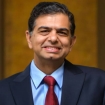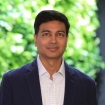Click here - 26th Annual Global CEO Survey: India perspective
How much is your mood today affecting your view of tomorrow?
Most CEOs highlight their concerns over the world economy. About 78% of India CEOs, 73% of global CEOs and 69% of Asia Pacific CEOs believe that global economic growth will decline over the next 12 months.
But our survey also indicates that despite the gloomy global outlook, India CEOs are hopeful about the country’s economic growth: more than five in ten CEOs (57%) express optimism about India’s economy over the next 12 months. In comparison, only 37% of Asia Pacific CEOs and 29% of global CEOs expect economic growth to improve in their countries or regions over the next 12 months.
57% of India CEOs are optimistic about India’s economic growth over the next 12 months.
The responses of India CEOs mark a dramatic shift from the mood in 2021, when 99% said India’s economic growth would improve over the next 12 months. The reasons are not far to seek. When the 25th Annual Global CEO Survey was being conducted in October–November 2021, it seemed the worst of the pandemic was over. But within weeks of fieldwork closing, news of the highly transmissible Omicron variant of SARS-CoV-2 broke out. When the present survey was conducted in 2022, the world was already reeling under the impact of the conflict in Europe and other macroeconomic issues.
The next steps
While it may be good to err on the side of caution, it is important that CEOs stay optimistic about the future. What is needed then is:
- an approach to combat bias in the boardroom by soliciting views through independent consultation or questionnaires
- discussions that are structured to consider overlooked possibilities
- assigning a devil’s advocate role for critical discussions.
How do your resilience and workforce strategies fit together?
The survey makes it clear that measures are being taken, or being planned, to meet the challenges of the future. Cost cuts are high on the priority list everywhere, with about 93% of India CEOs saying that they are cutting, have cut or are considering cutting operating costs and spurring revenue growth to mitigate economic challenges and volatility. About 85%, however, stress they will not reduce the size of their workforce, and 96% state they do not plan to reduce compensation – demonstrating their resolve to retain talent.
Employee attrition is another issue that confronts CEOs. The survey shows that India CEOs are divided, with 32% saying attrition rates will continue to increase slightly, moderately and significantly, and 34% holding that there will be no change. But this may be a bigger concern than is now being felt.
A marginally larger percentage (36%) of global CEOs believes that employee attrition is likely to increase slightly, moderately and significantly. A heartening observation is that globally, 60% emphasise that they do not plan to reduce the size of their workforce.
According to PwC’s India Workforce Hopes and Fears Survey 202210 the changing dynamics between the employer and employee over the past couple of years have modified the workplace. Today, employers are more focused on building a resilient workforce strategy that balances acting with speed and adaptability to position for scale.
Employees, on their part, place a premium on organisational trust, values and innovation, and these attributes are closely aligned with the ESG agenda. Innovative technologies can help mitigate climate risks; new age business models that entail the sharing of resources could enable circular business; and ESG levers such as diversity, equity and inclusion could strengthen the overall trust equation. Therefore, to enable a sustainable transformation over the next decade, companies would need to incorporate such ESG components to retain, upskill and motivate the workforce.

“Many millennials are now in mid-management functions and, therefore, in influencing positions. They often have a strong sense of values and prioritise fairness and value addition to customers over making money. These employees remain with the organisation once they realise the firm is offering tangible value to its customers.”
The next steps
Employers need to think in a more holistic and integrated manner when developing the employee value proposition, and focus on opportunities for creativity, innovation, authenticity and meaning beyond financial reward. Accordingly, CEOs need to:
- question assumptions through a data-driven approach to broaden the understanding of what drives employees
- democratise the workplace concept to focus on a ‘workplace of the people’
- prioritise culture as a competitive advantage
- use technology to enable productivity and performance
- provide opportunities to be one’s authentic best self at work.
As geopolitical risks rise, what new contingencies are you preparing for?
Geopolitical flashpoints have prompted CEOs to factor in disruptions in their scheme of things. Responding to a question on what actions, if any, their company is considering for the next 12 months because of the conflict in Europe, 67% of India CEOs say that they are adjusting supply chains; 59% highlight they are diversifying products and services; 50% emphasise that they are increasing investments in cybersecurity and data privacy, and 48% mention adjusting their presence in current markets and/or expanding into new markets.
In response to the current environment, 93% of India CEOs (as against 85% of global CEOs and 81% of Asia Pacific CEOs) say that they are reducing or planning to reduce operating costs.
India CEOs are adjusting supply chains in response to geopolitical conflict
The priorities for global CEOs are different: 48% stress on cybersecurity and data privacy. For most Asia Pacific CEOs, the most important action is adjusting markets or exploring new ones (53%), followed by supply chains (49%), diversifying products or services (48%) and increasing investments in cybersecurity or data privacy (47%).
PwC’s 2022 Digital Trust Insights Survey11 indicates that cybersecurity often becomes a concern for India CEOs only when they are contacted by regulators or during discussions on cyber and privacy implications of a new initiative or future strategy. It appears that when it comes to cybersecurity, India CEOs are more reactive than strategic or engaged.
India CEOs underscore the need to include the impact of possible disruptions in scenario planning and corporate operating models. Supply chains, for instance, in the past have relied on siloed functions, limited data availability, manual decision making and unconnected planning with limited options for customisation. The supply chain of the future needs to be:
- customised to cater to specific expectations of service levels/product availability/pack sizes
- made autonomous using AI and ML technology that can handle daily supply chain scenarios while leaders focus only on managing exceptions/extremely critical scenarios
- integrated through a supply chain control tower that would provide an end-to-end integrated view across plan, source, make and deliver
- powered by data analytics and integrated planning solutions to drive the underlying processes and optimisation requirements. A positive trend, indicated by a recent PwC survey, is that India’s manufacturing sector is keeping integrated supply chain planning among its top priorities for 3–5 years.

“Building flexibility in the supply chain is a more appropriate strategy than aiming for complete resiliency in the first place. The COVID-19 pandemic and the Russia-Ukraine conflict required Dr. Reddy’s Laboratories to bring in this flexibility by vigilant day-to-day monitoring of the situation and by reacting to these developments with agility. This flexibility led us to attaining resilience in our supply chain.”
The next steps
CEOs need to prepare for both anticipated and unanticipated disruptions and security risks to keep their businesses viable and growing. The need of the hour is to:
- plan scenarios for a wider range of disruptions, and invest in and develop more agile supply chain strategies powered by data and technology to enable real-time responses to crises before they occur
- customise to create a network of supply chains that is specifically tailored to customer needs, and ensure connected dashboards of data, key business metrics, and events personalised to decision-makers across the supply chain
- build rapid-response tech-savvy teams to handle crises and to ensure they are supported
- simplify the complex cybersecurity ecosystem and prioritise investments in the right areas
- develop a dedicated leadership group that understands the significance of cybersecurity and treats it as a priority.















